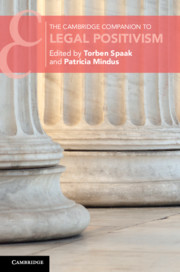Book contents
- The Cambridge Companion to Legal Positivism
- Cambridge Companions to Law
- The Cambridge Companion to Legal Positivism
- Copyright page
- Contents
- Figures
- Contributors
- Acknowledgements
- 1 Introduction
- Part I Fundamentals
- Part II History
- Part III Central Figures
- Part IV Main Tenets
- Part V Normativity and Values
- 24 Legal Positivism and Meta-Ethics
- 25 The Normativity of Law
- 26 An Italian Path to Legal Positivism: Ferrajoli’s Garantismo
- Part VI Critique
- Index
- References
25 - The Normativity of Law
from Part V - Normativity and Values
Published online by Cambridge University Press: 21 January 2021
- The Cambridge Companion to Legal Positivism
- Cambridge Companions to Law
- The Cambridge Companion to Legal Positivism
- Copyright page
- Contents
- Figures
- Contributors
- Acknowledgements
- 1 Introduction
- Part I Fundamentals
- Part II History
- Part III Central Figures
- Part IV Main Tenets
- Part V Normativity and Values
- 24 Legal Positivism and Meta-Ethics
- 25 The Normativity of Law
- 26 An Italian Path to Legal Positivism: Ferrajoli’s Garantismo
- Part VI Critique
- Index
- References
Summary
Brian considers the normativity of law within the framework of legal positivism, noting that the very idea of it has been understood differently by different authors. He proposes that we analyse the concept in terms of reasons for action, that such reasons must be something more than prudential reasons, that the proper question is whether law gives us reasons for actions of the relevant type that we would not have without law, and that Hume’s law makes this task difficult for legal positivists. He considers consequentialist justifications for the normativity of law proposed by Hobbes and Hume, Kelsen’s theory of the basic norm, Postema’s claim that the rule of recognition is a coordination convention, Shapiro’s planning theory of law, and Enoch’s triggering account, concluding that these accounts are all problematic in different ways. He observes that some authors see it as a specifically legal normativity that is neither moral nor prudential, while others conceive of it as moral normativity; he concludes that the former alternative needs elaboration and justification, while the latter is difficult to establish from within the legal positivist tradition.
- Type
- Chapter
- Information
- The Cambridge Companion to Legal Positivism , pp. 585 - 605Publisher: Cambridge University PressPrint publication year: 2021
References
- 2
- Cited by



